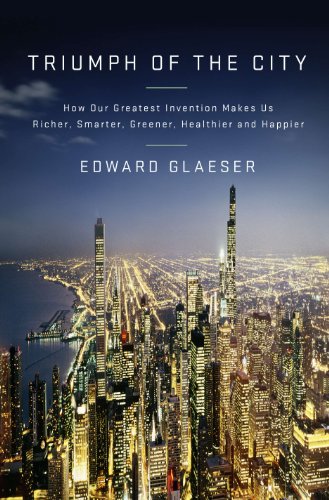6 Best-Selling Urban and Regional Economics Books Millions Love
Discover best-selling Urban and Regional Economics books recommended by William Whyte, Andrew M. Mwenda, and Grady Booch, blending expert insights with proven value.



There's something special about books that both critics and crowds love, especially in a field as vital as Urban and Regional Economics. These books not only shape how cities grow and thrive but also influence policies that affect millions. Understanding urban economic dynamics is key now more than ever, as cities face unprecedented challenges and opportunities for sustainable growth.
Experts like William Whyte, author of City: Rediscovering the Center, praise The Death and Life of Great American Cities for its heartfelt and insightful analysis of urban vitality. Meanwhile, Andrew M. Mwenda, a respected political commentator, highlights Triumph of the City for its surprising insights into traffic and urban prosperity. Grady Booch, known for his systems thinking, calls Jacobs's classic a "remarkable book," emphasizing its lasting influence.
While these popular books provide proven frameworks, readers seeking content tailored to their specific Urban and Regional Economics needs might consider creating a personalized Urban and Regional Economics book that combines these validated approaches with your unique context.
Recommended by William Whyte
Author of City: Rediscovering the Center
“One of the most remarkable books ever written about the city . . . a primary work. The research apparatus is not pretentious—it is the eye and the heart—but it has given us a magnificent study of what gives life and spirit to the city.” (from Amazon)
What if everything you knew about urban planning was wrong? Jane Jacobs challenges the top-down, architect-driven visions that dominated mid-20th century city design, arguing instead for vibrant, diverse neighborhoods where street life thrives. Drawing from her experience as a writer and activist in New York City, she offers insights into what makes cities livable, from mixed uses to the importance of sidewalks and local economies. You’ll gain a new perspective on urban vitality and the social fabric that sustains it, making this book essential if you care about how cities grow and function. The detailed observations in chapters like "The Uses of Sidewalks" are eye-opening for anyone involved in urban development or community advocacy.
E.S. Mills, an esteemed figure in urban economics, compiled this volume to assemble definitive research on key urban economic topics from a global perspective. You’ll explore detailed surveys on locational analysis, specific urban markets, and government policy, gaining a multifaceted understanding of how cities function economically. Each section is authored by top scholars, offering you rigorous frameworks and data-rich insights that are particularly useful if you’re involved in academic research or urban planning. While dense, this handbook serves as a foundational reference rather than light reading, so it’s best suited for those deeply engaged with urban economic theory and policy.
This tailored book explores urban economic methods with a focus on the challenges you face in your unique environment. It covers key concepts and real-world applications, blending widely respected knowledge with insights aligned specifically to your background and goals. This personalized approach ensures it addresses your particular interests in urban growth, market dynamics, and policy impacts, making complex economic dynamics accessible and relevant. The book examines how urban economies function, revealing patterns in land use, infrastructure, and regional development that shape city success. By focusing on your needs, it fosters a deeper understanding of the economic forces at play in urban settings, empowering you to apply these ideas effectively.
Recommended by Andrew M. Mwenda
Prominent political commentator and author
“@murungiasinani Please read a truly great book, The Triumph of the City, by Edward Glazer. He presents research that found that narrowing roads reduces traffic jams while enlarging them increases jams. Reality, my grand son, is often different from our common sense assumptions!” (from X)
by Edward L. Glaeser··You?
Edward L. Glaeser, a Harvard economics professor with deep expertise in urban issues, challenges common beliefs about cities in this book. You’ll explore how urban areas, often criticized for pollution and crime, actually foster economic prosperity, better health, and environmental benefits. For example, Glaeser highlights how New Yorkers live longer and use less energy than suburban residents, and unpacks why expanding roads can worsen traffic, contrary to intuition. This book suits anyone curious about the hidden forces shaping city life and who wants a nuanced understanding of urban economics and planning.
by Mary E. Edwards·You?
Mary E. Edwards’s decades of experience in regional economic research shaped this detailed exploration of urban and regional economic dynamics. You’ll navigate through spatial economics, firm location theories, and regional growth models while also gaining insights into urban land use patterns and public finance challenges. The book’s structure, dividing topics into market analysis, growth, land use, and policy, lets you build a solid understanding of how economic factors influence urban development and policy decisions. If you’re studying or working in economic development or urban planning, this text offers a grounded approach to analyzing complex regional economic systems without unnecessary jargon.
by Pietro S. Nivola·You?
by Pietro S. Nivola·You?
What happens when urban policy meets sprawling metropolitan realities? Pietro S. Nivola digs into the persistent growth of American suburbs, questioning the role government policies play in shaping these landscapes. He contrasts sprawling U.S. cities with Europe's more compact urban forms, exposing how tax codes, energy initiatives, and agricultural subsidies inadvertently fuel sprawl. You’ll gain insight into why traditional U.S. urban solutions—like mass transit projects and smart growth controls—often miss the mark and what policy reforms might realistically curb suburban expansion. This book suits you if you want a clear-eyed analysis of policy-driven urban development and practical comparisons across continents.
by TailoredRead AI·
This tailored AI book explores urban economic growth with a focus on step-by-step actions that suit your unique background and goals. It reveals key concepts and practical ideas in urban economics, emphasizing rapid understanding and application of urban growth principles. By tailoring content to your interests, it connects proven knowledge with your specific needs, making complex topics accessible and relevant. This personalized approach helps you grasp crucial elements such as market dynamics, policy impacts, and socioeconomic factors shaping cities today. Through focused chapters, the book examines urban development cycles and economic strategies, providing a pathway to quickly deepen your insights and engage with real-world urban challenges.
by Philip McCann·You?
by Philip McCann·You?
After analyzing international cases and classic economic models, Philip McCann presents an integrated framework that reshapes how you understand urban and regional economics. The book dives into spatial and geographical influences on economic behavior, combining Classical, Neo-classical, and Keynesian theories with real-world examples from around the globe. You'll gain insight into foundational concepts like land use, economic geography, and urban planning principles, all presented in a concise and accessible style. This text suits anyone studying or working in economics, urban planning, or land management who needs a clear yet rigorous introduction to how location shapes economic outcomes.
Proven Urban Economics Methods, Personalized ✨
Get popular strategies tailored to your unique Urban and Regional Economics challenges.
Trusted by thousands of Urban Economics enthusiasts worldwide
Conclusion
This collection highlights clear themes: the importance of community-driven urban design, the role of economic theory in shaping policy, and the critical impact of government decisions on city landscapes. If you prefer proven methods grounded in real-world experience, start with The Death and Life of Great American Cities and Triumph of the City. For validated, detailed frameworks, combine Handbook of Regional and Urban Economics with Regional and Urban Economics and Economic Development.
Alternatively, you can create a personalized Urban and Regional Economics book to combine proven methods with your unique needs. These widely-adopted approaches have helped many readers succeed in understanding and influencing urban growth.
Frequently Asked Questions
I'm overwhelmed by choice – which book should I start with?
Start with The Death and Life of Great American Cities for an engaging introduction to urban vitality and planning. It’s accessible and widely praised, providing a solid foundation before diving into more technical texts.
Are these books too advanced for someone new to Urban and Regional Economics?
Not at all. Books like Urban and Regional Economics by Philip McCann offer clear explanations suitable for newcomers, while others like the Handbook of Regional and Urban Economics are better for advanced readers.
Should I start with the newest book or a classic?
Classic works like Jane Jacobs's The Death and Life of Great American Cities remain fundamental. Pairing these with newer perspectives from books like Triumph of the City balances historical insight with current research.
Do I really need to read all of these, or can I just pick one?
You can pick based on your goals. For practical urban planning, Jacobs’s book is key; for economic theory, the Handbook is ideal. Reading a couple offers broader understanding without overwhelming you.
Which books focus more on theory vs. practical application?
Handbook of Regional and Urban Economics is theory-heavy, suitable for research. In contrast, The Death and Life of Great American Cities and Triumph of the City offer practical insights relevant to planners and policymakers.
How can I get content tailored to my specific Urban and Regional Economics interests?
While these expert-recommended books are valuable, personalized content can target your unique goals and experience. You can create a personalized Urban and Regional Economics book that blends proven methods with your exact needs for more efficient learning.
📚 Love this book list?
Help fellow book lovers discover great books, share this curated list with others!
Related Articles You May Like
Explore more curated book recommendations





